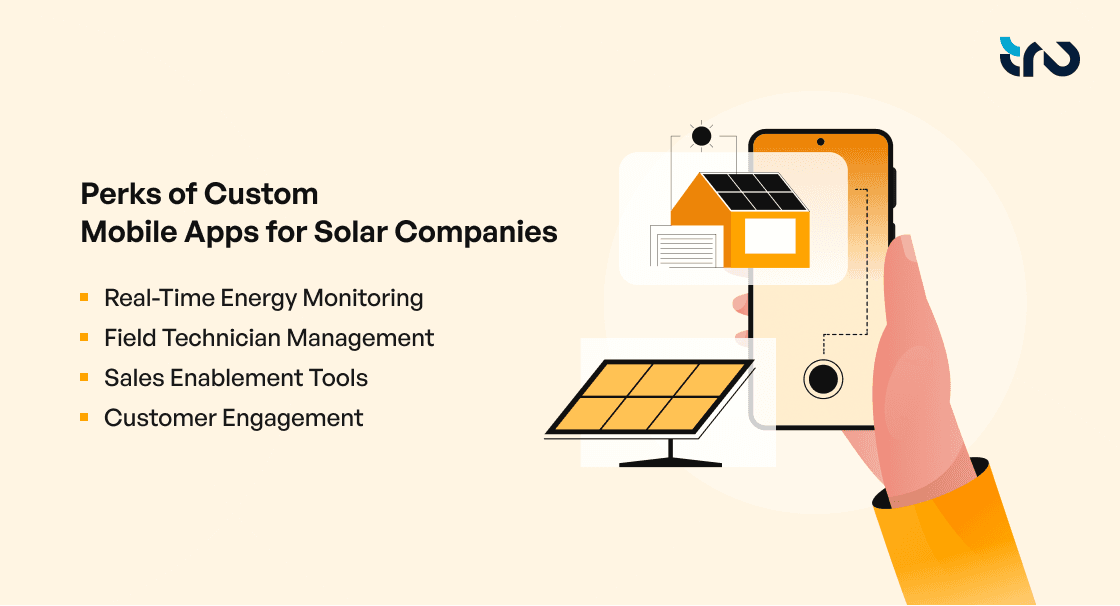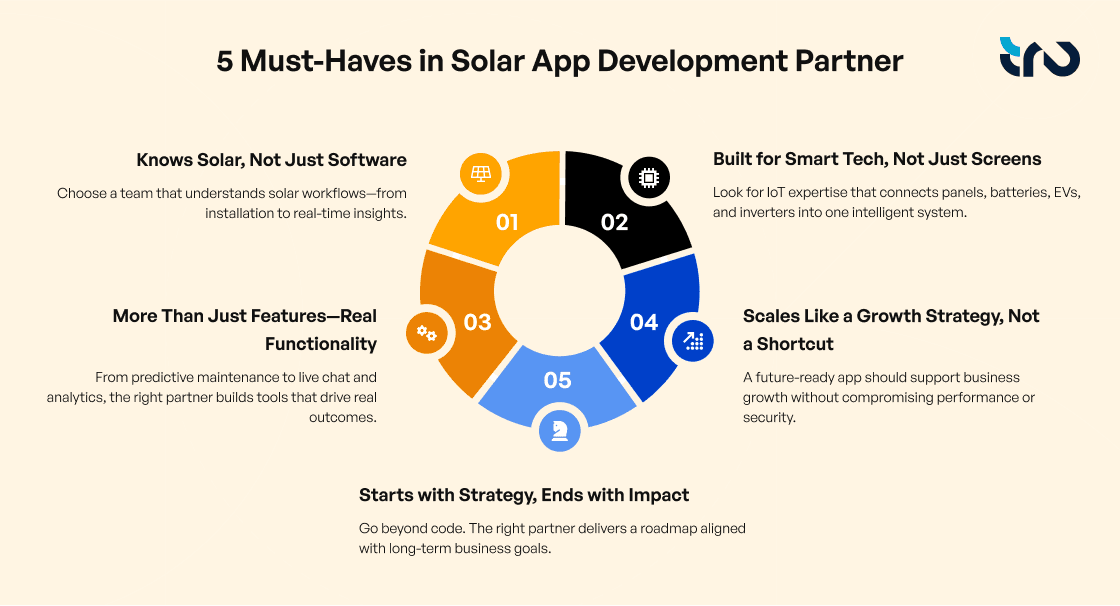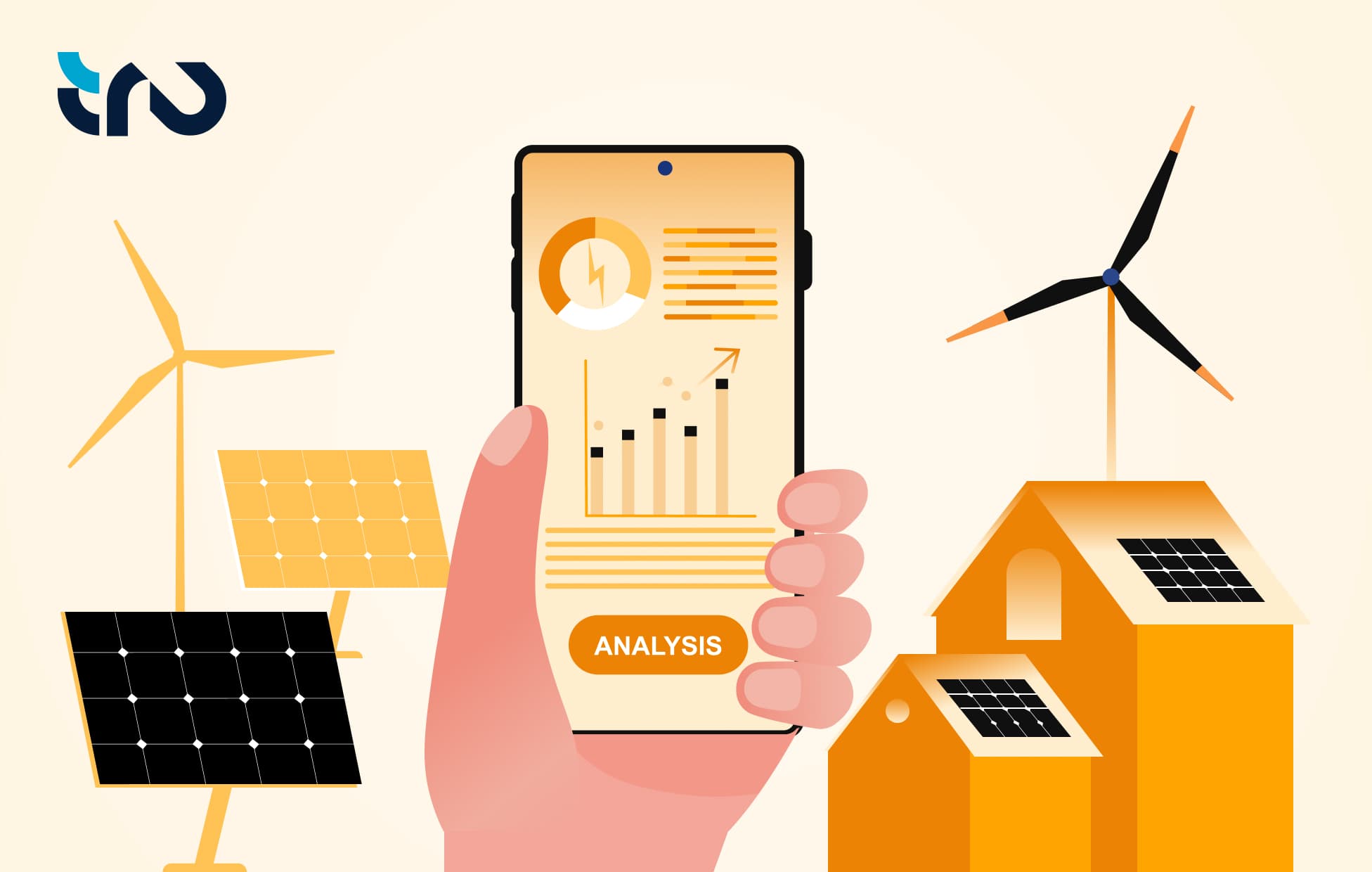Imagine managing site inspection, updating clients, tracking system performance, and coordinating the field team–all from a mobile. No need for spreadsheets, no back-and-forth calls, just real-time control at your fingertips.
This is not a futuristic pitch, it is the new normal. A 2025 report by Reviews.org shows the average person checks their phone 205 times a day, proving mobile apps are now the control center of modern life. This shift has raised expectations across industries, especially in how solar companies operate, communicate, and deliver value.
As per Draft Power Plan VIII, solar is projected to reach 17% of power generation by 2025 and 14% by 2030, with capacity rising to 20 GW. Yet, despite this momentum, many solar companies still rely on outdated tools, slow operations, and create friction for customers.
That’s where custom mobile apps make the difference. Built specifically for solar workflows, streamlining operations, improving customer engagement, and providing real-time insights.
In this blog, we will explore how mobile technology is helping solar businesses scale faster, work smarter, and stay competitive in today’s fast-moving energy market.
Why Mobile App Development Matters for Solar Energy Businesses
In today’s time, convenience and control shape customer expectations. In the solar industry, that translates to providing users with instant access to their energy systems through mobile apps.
Customers now expect more than just solar panels. They expect to track performance, monitor savings, and receive updates without relying on support calls or manual paperwork.
This behavioral shift aligns with industry trends. According to Allied Market Research, the global solar tracker market was valued at $8.9 billion in 2021 and is projected to reach $16 billion by 2031. The growth reflects a broader move toward smarter, app-based energy solutions.
Companies such as Tesla and Enphase are already setting benchmarks. Their mobile apps allow users to manage battery storage, monitor energy output, and receive real-time alerts. Simply put, capabilities that are fast becoming standard across the sector.
As market expectations evolve, mobile app development for solar companies is no longer a future-forward idea–it is a critical step toward improving service delivery, building trust, and remaining competitive.
Key Benefits of Custom Mobile Apps for Solar Companies

Off-the-shelf tools often fall short of meeting the operational demands of solar companies. Custom mobile apps designed around actual business workflows drive measurable improvements in performance, customer experience, and internal team coordination.
Power up the solar strategy with these game-changing perks.
1. Real-Time Energy Monitoring
System performance, energy output, and savings can be displayed through personalized dashboards of mobile apps. These insights enhance transparency and reduce the volume of customer support inquiries.
2. Field Technician Management
Job assignments, maintenance alerts, and service logs can be managed directly within the app. This streamlines technician response times and ensures workflow continuity across teams.
3. Sales Enablement Tools
Features like integrated quoting, financing calculators, and digital onboarding tools allow sales teams to accelerate deal closures without switching between platforms.
4. Customer Engagement
Push notifications, solar health reports, and educational content create a stronger post-installation journey. Solar energy business app development enables features like live chat support and predictive maintenance, all tailored to user behavior and system data.
With custom apps built specifically for solar business operations, providers gain the ability to improve service delivery, optimize fieldwork, and build long-term customer loyalty at scale.
Use Cases: How Leading Solar Brands Are Leveraging Custom Apps
Top solar companies are actively leveraging custom apps to address real-world operational challenges, drive efficiency, and enhance customer experience. These use cases demonstrate how mobile platforms are not only improving service but also reshaping end-to-end workflows across the solar value chain.
• SunPower
SunPower’s mobile app provides customers with real-time insights into every production, battery levels, and cost savings. It also includes mobile-based system alerts and support features, creating a transparent and streamlined post-installation experience. This transparency reduces inbound service requests and builds long-term customer trust.
• SolarEdge
SolarEdge offers dedicated mobile platforms for both customers and technicians. Homeowners can monitor system performance and receive live status updates, while field teams use the same platform for diagnostics, minimizing the need for in-person service calls and accelerating response times.
The dual-app model reduces truck rolls, speeds up issue resolution, and strengthens SolarEdge’s reputation for technical innovation.
• Enphase
The Enphase mobile app offers a unified interface to manage solar systems, battery storage, and EV chargers. Predictive alerts and detailed usage analytics are core features that keep users informed and engaged across energy touchpoints. By consolidating energy control into a single app, Enphase enhances engagement and ecosystem loyalty.
These examples underscore the strategic value of solar energy business app development. When apps are aligned with actual workflows and customer expectations, they move beyond support tools and become core enablers of business growth and innovation.
Choosing the Right App Development Services for Your Solar Business
Selecting the right app development services is essential for solar companies that are aiming to achieve long-term value, not just functional software. A development partner with solar industry experience, like Tru, can better support end-to-end workflows of the solar industry, from installation processes to post-sale service.
Additionally, expertise in IoT (Internet of Things) integration is essential for including real-time data from inverters, batteries, and other system components to ensure seamless and secure performance.
Scalability and security must be prioritized. As the business expands, the mobile app should maintain consistent performance while safeguarding customer data across all stages.
With the right development team, it’s possible to move beyond basic functionality and deliver custom features such as predictive maintenance, live chat, and real-time system updates. This allows for building a mobile app that aligns with strategic objectives and delivers measurable value to both operations and users.

Future Trends in Solar App Development: AI, IoT & Smart Grids
The next phase of solar innovation is mobile, intelligent, and deeply connected. What used to be basic system monitoring tools are now evolving into comprehensive platforms that unify data, devices, and decisions.
This transformation is being accelerated by increased energy demand, grid stress, and the rapid growth of renewable energy. According to the International Energy Agency, investment in electricity grids must double by 2030 to meet net-zero targets, with much of that investment directed toward smart grid technologies and digital infrastructure.
These emerging trends are already reshaping the future of solar app development.
Artificial intelligence is enabling predictive maintenance and intelligent energy forecasting.
The Internet of Things (IoT) connects solar panels, batteries, and EV chargers into unified, real-time networks.
Smart grid integration facilitates direct communication between solar systems and utilities, allowing for dynamic load balancing and more efficient energy flow.
Blockchain for energy transactions is opening new models for peer-to-peer energy trading and decentralized billing.
Looking ahead, custom mobile app development for solar companies will serve as the digital backbone of clean energy-more connected, more intelligent, and more essential than ever.
Ready to Build a Custom Mobile App for Your Solar Company?
Custom mobile apps are redefining how solar companies operate. For businesses focused on long-term growth and operational efficiency, custom app development offers more than convenience–it unlocks speed, scalability, and smarter solar outcomes.
Tru helps solar companies build custom apps to streamline the field operations, enable real-time energy monitoring, and elevate the post-installation experience. Every feature is tailored to the company’s exact operational needs and strategic goals.
Start with a free strategy session to explore how a custom mobile app can drive measurable results and become a long-term advantage.
Turn your vision into a high-performing app that delivers real impact.
Contact UsFrequently Asked Questions (FAQs)
Costs depend on the scope, features, and integrations required. Simple apps may start around $30,000, while more advanced platforms with AI, IoT, or real-time analytics typically cost more.
Development timelines usually range from 3 to 6 months. This includes planning, design, development, testing, and deployment phases.
Supporting both iOS and Android is ideal. A cross-platform approach ensures accessibility for customers and technicians, regardless of their device.
Yes. Through IoT integration, the app can connect with devices such as inverters, batteries, and EV chargers to provide real-time system data and alerts.
Yes. Custom mobile apps are built to scale. New modules and features can be added over time as your business evolves.



